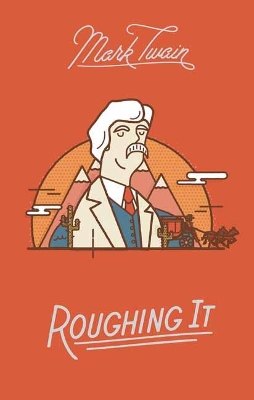Centre for Editions of American Authors S.
2 total works
A marvelously vivid, many-sided portrait of America's frontier days.
Mark Twain's rambling took him all over the American West during teh 1860's. He prospected for gold and silver, speculated on timber and mining stocks, sailed to Hawaii, and worked for a succession of small newspapers. In Roughing It, his fictionalized account of these years, tall tales abound, as do sketches of unforgettable characters: desperadoes, vigilantes, newspapermen, Mormons, and prospectors.
Twain's Debt to the burlesque styling of regional humorists and his celebrated gift for accurately rendering regional speech are never more in evidence than here, but as Hamlin Hill points out in his introduction, Roughing It must also be read as Twain's renunciation of his footloose bachelorhood, his rejection of the mythic, romanticized image of the West, and his autopsy of the American dream.
For more than seventy years, Penguin has been the leading publisher of classic literature in the English-speaking world. With more than 1,700 titles, Penguin Classics represents a global bookshelf of the best works throughout history and across genres and disciplines. Readers trust the series to provide authoritative texts enhanced by introductions and notes by distinguished scholars and contemporary authors, as well as up-to-date translations by award-winning translators.
Mark Twain's rambling took him all over the American West during teh 1860's. He prospected for gold and silver, speculated on timber and mining stocks, sailed to Hawaii, and worked for a succession of small newspapers. In Roughing It, his fictionalized account of these years, tall tales abound, as do sketches of unforgettable characters: desperadoes, vigilantes, newspapermen, Mormons, and prospectors.
Twain's Debt to the burlesque styling of regional humorists and his celebrated gift for accurately rendering regional speech are never more in evidence than here, but as Hamlin Hill points out in his introduction, Roughing It must also be read as Twain's renunciation of his footloose bachelorhood, his rejection of the mythic, romanticized image of the West, and his autopsy of the American dream.
For more than seventy years, Penguin has been the leading publisher of classic literature in the English-speaking world. With more than 1,700 titles, Penguin Classics represents a global bookshelf of the best works throughout history and across genres and disciplines. Readers trust the series to provide authoritative texts enhanced by introductions and notes by distinguished scholars and contemporary authors, as well as up-to-date translations by award-winning translators.
The Mysterious Stranger, published posthumously in 1916 and belonging to Twain's "dark" period, belies the popular image of the affable American humorist. At the time this work was written, Twain had suffered a series of painful physical, economic, and emotional losses.In this antireligious tale, he denies the existence of a benign Providence, a soul, an afterlife, and even reality itself. As the Stranger in the story asserts, "nothing exists; all is a dream."

